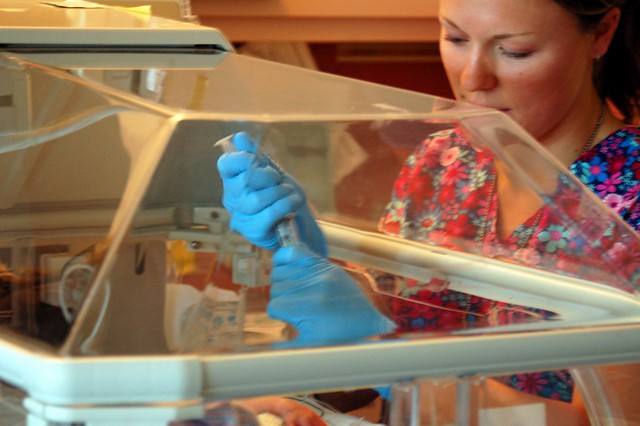In order for premature babies to grow and gain strength they need proper nutrition. Feedings help your baby to grow as if they were in the womb during the third trimester– this includes their weight, length and their head size (measured as their head circumference), and gain weight. Nutrition is especially important for brain growth and development.
- Parameters: A premature baby’s weight generally decreases over the first few days, then gradually begins to increase, and should follow the growth curve in your baby’s chart. Your baby’s length and head circumference should also follow this curve.
- Initially ELBW (<1000 g) and VLBW (<1500 g) babies cannot suck, swallow, or breathe well enough to meet their needs so their first calories will be given through an IV line directly into their bloodstream. They may also feed on fortified breast milk (breast milk with special premature baby formula), via a feeding tube through their nose or mouth into the stomach. In some cases, their feeding may be a combination of the two methods. Ask your nurse if there are ways that you can participate with feeding, as it can be an important bonding experience with your baby.
- Although they may look scary, the tubes in your baby’s mouth or veins do not cause pain or discomfort, except possible momentary discomfort when the tube is first placed.
- Nutrition provided through tubes and/or IV may be adjusted based on your baby’s needs.

USCF Children's Hospital Nurse feeds baby via canula. (Sheraz Sadiq, Flickr CC)
Breastfeeding Your Premature Baby
If you choose to begin breastfeeding, it is recommended that you start regular pumping within 6 hours of birth. Our care team is available to help provide support throughout this process.
Click here to learn more about the importance of breastmilk as a source of nutrients for your premature baby.
As Your Baby Grows
Many premature babies can begin breastfeeding, at the breast, at 32 weeks. Learning how to breastfeed will take time for both you and your baby. The time can allow you and your baby to bond. Your baby may show they are ready for breastfeeding by:
- Sucking on his or her fists
- Waking up before feeds
- Searching for your nipple with his or her mouth
- Enjoying his or her soother during tube feeds
Talk to your baby’s nurses, doctors, and dieticians to decide when this should begin, if you choose to breastfeed.
References:
AbbVie Corporation (Ed.). (2015). Preemie Parent Handbook (4th ed.). Canada: AbbVie Corportation.
B.C. Children's Hospital. (1998). Getting Started: Breastfeeding Your Premature Baby.